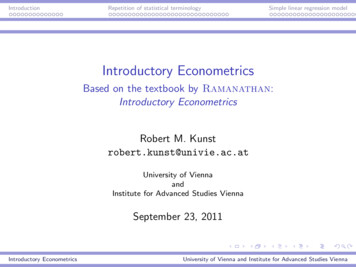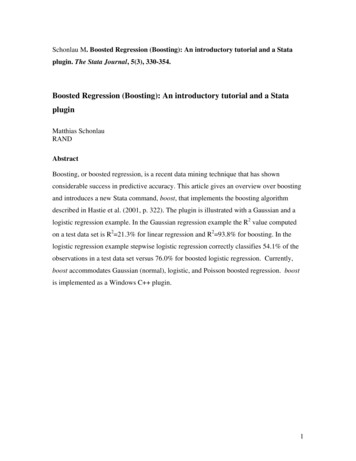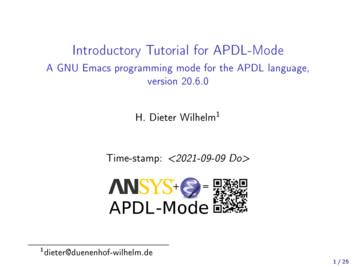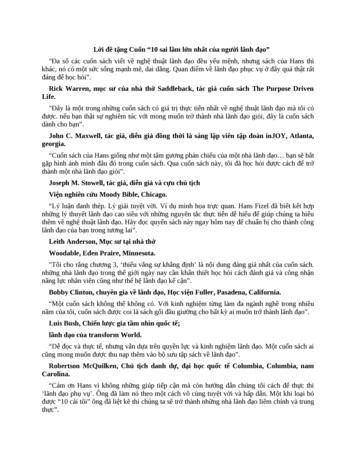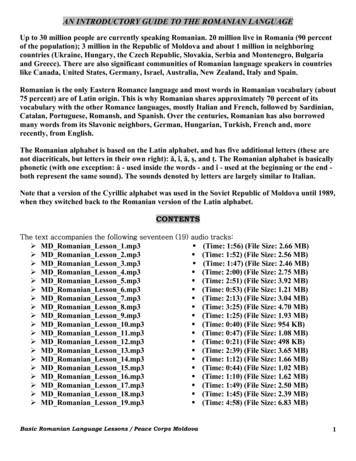
Transcription
AN INTRODUCTORY GUIDE TO THE ROMANIAN LANGUAGEUp to 30 million people are currently speaking Romanian. 20 million live in Romania (90 percentof the population); 3 million in the Republic of Moldova and about 1 million in neighboringcountries (Ukraine, Hungary, the Czech Republic, Slovakia, Serbia and Montenegro, Bulgariaand Greece). There are also significant communities of Romanian language speakers in countrieslike Canada, United States, Germany, Israel, Australia, New Zealand, Italy and Spain.Romanian is the only Eastern Romance language and most words in Romanian vocabulary (about75 percent) are of Latin origin. This is why Romanian shares approximately 70 percent of itsvocabulary with the other Romance languages, mostly Italian and French, followed by Sardinian,Catalan, Portuguese, Romansh, and Spanish. Over the centuries, Romanian has also borrowedmany words from its Slavonic neighbors, German, Hungarian, Turkish, French and, morerecently, from English.The Romanian alphabet is based on the Latin alphabet, and has five additional letters (these arenot diacriticals, but letters in their own right): ă, î, â, ş, and ţ. The Romanian alphabet is basicallyphonetic (with one exception: â - used inside the words - and î - used at the beginning or the end both represent the same sound). The sounds denoted by letters are largely similar to Italian.Note that a version of the Cyrillic alphabet was used in the Soviet Republic of Moldova until 1989,when they switched back to the Romanian version of the Latin alphabet.CONTENTSThe text accompanies the following seventeen (19) audio tracks:¾¾¾¾¾¾¾¾¾¾¾¾¾¾¾¾¾¾¾MD Romanian Lesson 1.mp3MD Romanian Lesson 2.mp3MD Romanian Lesson 3.mp3MD Romanian Lesson 4.mp3MD Romanian Lesson 5.mp3MD Romanian Lesson 6.mp3MD Romanian Lesson 7.mp3MD Romanian Lesson 8.mp3MD Romanian Lesson 9.mp3MD Romanian Lesson 10.mp3MD Romanian Lesson 11.mp3MD Romanian Lesson 12.mp3MD Romanian Lesson 13.mp3MD Romanian Lesson 14.mp3MD Romanian Lesson 15.mp3MD Romanian Lesson 16.mp3MD Romanian Lesson 17.mp3MD Romanian Lesson 18.mp3MD Romanian Lesson 19.mp3 Basic Romanian Language Lessons / Peace Corps Moldova(Time: 1:56) (File Size: 2.66 MB)(Time: 1:52) (File Size: 2.56 MB)(Time: 1:47) (File Size: 2.46 MB)(Time: 2:00) (File Size: 2.75 MB)(Time: 2:51) (File Size: 3.92 MB)(Time: 0:53) (File Size: 1.21 MB)(Time: 2:13) (File Size: 3.04 MB)(Time: 3:25) (File Size: 4.70 MB)(Time: 1:25) (File Size: 1.93 MB)(Time: 0:40) (File Size: 954 KB)(Time: 0:47) (File Size: 1.08 MB)(Time: 0:21) (File Size: 498 KB)(Time: 2:39) (File Size: 3.65 MB)(Time: 1:12) (File Size: 1.66 MB)(Time: 0:44) (File Size: 1.02 MB)(Time: 1:10) (File Size: 1.62 MB)(Time: 1:49) (File Size: 2.50 MB)(Time: 1:45) (File Size: 2.39 MB)(Time: 4:58) (File Size: 6.83 MB)1
INTRODUCTION TO THE TRAININGAs you intend to come to Moldova it's important to learn enough Romanian so that you feelcomfortable in your everyday communication with Moldovans. Peace Corps Moldova providesyou a Pre Departure Online Training (P.DOT) that hopefully will give a general view about thelanguage and sufficient useful information that will help you to communicate in the first days ofyour stay in Moldova.Training consists of 19 lessons that combine basic phrases, words and grammar structures.Throughout the training you will have the opportunity to listen to a variety of dialogues, recordedby native Romanian speakers, and learn key phrases and basic grammatical concepts.We are trying to use nontraditional teaching techniques that are based on listening andconversational approaches. The training aims to develop comprehension skills and competence inuse of communicative functions. It does not underline the importance of spelling, grammar orknowing how to read and write, but the ability to communicate, to handle a simple conversationin everyday life situations. This is why we encourage you to listen to the lessons as many times aspossible in order to get used to the pronunciation of words and expressions and then to have abasis for speaking.We are aware of the fact that there are different methods of learning a foreign language that iswhy every audio lesson is accompanied by the written content (text).Good luck!Basic Romanian Language Lessons / Peace Corps Moldova2
Lesson 1:Listening ExercisesExercise 1: Conversational RomanianOne of the most important things in studying a foreign language is to get used to its tones.What we encourage you to do is to listen to the following exercise as many times as possible inorder to get familiar with the Romanian sounds (pronunciation).Limba română este de provenienţă latină, soră cu italiana, franceza, spaniola, portugheza. Estevorbită de aproximativ 30 de milioane de oameni în România, Republica Moldova şi Ucraina.Pînă în present, limba română a fost studiată de peste 650 de voluntari în Corpul Păcii dinMoldova. Moldovenii sînt mîndri de limba lor. Chiar şi imnul Republicii Moldova se numeşte„Limba noastră”.Româna e considerată de către specialişti una dintre cele mai muzicale limbi din lume.LIMBA NOASTRĂEste a noastră limba noastrăşi noi sîntem cu ea popor,cum stelele din cersînt stelecu veşnica lumină-a lor.Este a noastră limba noastrăşi noi sîntem cu ea pămînt,cum marea mareeste marecu ape veşnic vălurînd.Este a noastră limba noastrăşi soartă noi sîntem cu ea,cum este codru verde soartăcu ciuta şi cu pasărea.Din străbunici cu limba noastrănoi am crescut şi creştem, demn,cum creştem pomul din ţărînăsuită-n frunză şi în lemn.Ci noi cu ea, culimba noastră,nemuritori vom fi oricînd,nemuritor cum e Pămîntulcu Soarele mereu arzînd.(Dumitru Matcovschi)Basic Romanian Language Lessons / Peace Corps Moldova3
Lesson 2:Basic w are you?Fine, thank you.Excuse me.I am sorry.It was nothing.Nice to meet you!Goodbye.Good.Please.Thank you very much!Yes.No.You are welcome!Cheers!What is your name?My name is .Good morning!Good afternoon!Good evening!Good night!See you later .I do not speak Romanian.Bună!Salut!Ce mai faceţi?Bine, mulţumesc.Scuzaţi-mă.Îmi pare rău.Nu-i nimicÎmi pare bine!La revedere.Bine.Vă rog.Mulţumesc mult!Da.Nu.Cu plăcere!Noroc!Cum vă numiţi?Numele meu este.Bună dimineaţa!Bună ziua!Bună seara!Noapte bună!Pe curînd.Nu vorbesc româneşte.I do not understand.I understood.I speak a little Romanian.Eu nu înţeleg.Eu am înţeles.Eu vorbesc puţin româneşte.Excellent!I need some water.Unfortunately.I am a vegetarian.I am hungry.I am thirsty.Excelent!Am nevoie de apă.Din păcate.Sînt vegetarian.Mi-e foame.Mi-e sete.boo - nuhsa - lootcheh my faht - chaitsbee - nay, mool - tsu - meskscoo - zah - tsee - muhoohm pah-reh ruh-ohnooee nee - meecoohm pah-reh bee-nehlah reh-veh-deh-rehbee - nehvuh rohgmool-tsu-mesk mooltdahnookoo pluh-chai-rehnoh - rokcoom vuh noo-meetsnoo-meh-leh meh-oo yehstehboo-nuh dee-mee-nyah-tsuhboo-nuh zee-wahboo-nuh syah-ruhnwahp-teh boo-nuhpeh cur-oohndnoo vor-besk ro-moohn-eshtehyuh noo oohn-tseh-legyuh ahm oohn-tseh-lesyuh vor-besk pooh-tsin romoohn-esh-tehex-che-lentahm neh-voyeh deh apuhdeen puh-cah-tehsoont veh-geh-tah-ree-ahnmyeh fwah-mehmyeh seh-tehBasic Romanian Language Lessons / Peace Corps Moldova4
Lesson hat is your name?My name is Mark.Glad to meet you!I am glad to meet you too!Bună ziua.Cum te cheamă?Mă cheamă Mark.Îmi pare bine!Şi mie îmi pare bine!How old are you?I am twenty three years old.Are you married?Yes.No.Do you have children?I have a son.I have a daughter.Where are you from?I am from Boston.Do you have any brothers?Sisters?Do you like Moldova?Yes, I like it very much.Cîţi ani ai?Eu am douăzeci şi trei de ani.Eşti căsătorit?Da.Nu.Ai copii?Am un fiu.Am o fiică.De unde eşti?Eu sînt din Boston.Tu ai fraţi? Surori?boo-nuh zee-uahkoom teh kyah-muhmuh kyah-muh .oohm pah-reh bee-nehshee meeh oohm pah-reh beenehcoohts ahn aheeyuh ahm 23 deh ahnehsht kuh-suh-toh-reetdahnooahee koh-peeahm oon fee-ooahm oh fee-cuhdeh oon-deh ehshteeyuh soohnt deen Bostontoo ahee frah-tsee / soo-roh-reeWhat did you do in America?Ce ai lucrat în America?I was a student / engineer /doctor / farmer / teacher Eu am fost student / inginer /doctor / fermier / profesor .What is the Romanian for ?Cum se spune româneşte .?How do you feel?I am a little tired.May I go into my room?Cum te simţi?Sînt puţin obosit.Pot să merg în camera mea?SureYour room is right here.SigurCamera ta este aici.Thank you.Mulţumesc.Îţi place Moldova?Da, îmi place foarte mult.Basic Romanian Language Lessons / Peace Corps Moldovaoohtsee plah-cheh Moldovadah, oohm plah-cheh fwahrteh mooltcheh ahee loo-kraht oohnAmericayuh ahm fohst stoo-dehnt / injee-nehr / dohk-tohr / fehrmee-ehr / proh-feh-sohrkoom seh spoo-neh ro-moohnesh-the ?koom teh seem-tseesoohnt poo-tseen oh-boh-seetpoht suh mehrg oohn kahmeh-rah myahsee-goorkah-meh-rah tah yes-tehaheechmool-tsu-mesk5
Lesson 4:Some Basic Questions and When?How?Why?What is this?What do I need to do?Where is the Internet Café?How can I get to the hotel?Cine?Ce?Unde?Cînd?Cum?De ce?Ce este aceasta?Ce trebuie să fac?Unde este Internet Cafe?Cum pot să ajung la hotel?Go straight. to the right. to the left.The hotel is close.The restaurant is far.Mergeţi înainte. la dreapta. la stînga.Hotelul este aproape.Restaurantul este departe.What does it mean?Ce înseamnă aceasta?Where can I buy coffee?Unde pot să cumpăr cafea?How much does a coffee cost?Give me a juice, pleaseI am lost.I have a small problem.Cît costă o cafea?Daţi-mi, vă rog, un suc.M-am rătăcit.Am o mică problemă.I do not feel well.I am sick.I have a stomach ache.What time is it?It is late.Where can I get a taxi?Nu mă simt bine.Sînt bolnav.Mă doare stomacul.Cît este ora?Este tîrziu.Unde pot să iau un taxi?Where can I exchange dollars?Unde pot să schimb dolari?Who is this person?Cine este această persoană?I need help.Am nevoie de ajutor.Could you help me, please?Puteţi să mă ajutaţi, vă rog?What is the exchange rate?Care este cursul valutar?chee-nehchehoon-dehcoohndcoomdeh chehcheh yes-teh ah-chahs-tahcheh treh-boo-yeh suh fahkoon-deh yes-teh coom poht suh ah-zhoong lah mehr-jehts oohn-aheen-teh lah dryah-ptah lah stoohn-gah yes-teh ah-pro-pehrehs-tah-oo-rahn-tool yes-tehdeh-pahr-tehcheh oohn-syahm-nuh ahchahs-tahoon-deh poht suh coom-puhrkah-fyahcooht cohs-tuh oh kah-fyahdah-tseem, vuh rohg, oon sookmahm ruh-tuh-cheetahm oh mee-cuh proh-blehmuhnoo muh seemt bee-nehsoont bohl-nahvmuh doh-reh stoh-mah-coolcooht yes-teh oh-rahyes-teh toohr-zee-uhoon-deh poht suh yah-uh oon oon-deh poht suh skeemb dohlahrchee-neh yes-teh ah-chahs-tahpehr-soh-nuhahm neh-voh-ye deh ah-jootohrpoo-tehts suh muh ah-jootahts, vuh rohgka-reh yes-teh coor-sool vahloo-tahrBasic Romanian Language Lessons / Peace Corps Moldova6
The Romanian AlphabetLesson 5:LetterSoundSimilarExampleMeaningEnglish neyogaYyyogayogazipZzzzîmbetsmileNote: Any Romanian word starting with “e” is pronounced with an English “y” sound at the beginning.Example: “este” is pronounced as yes-tehPhonetic Variations:cecichechi: sounds like „che” in chest: sounds like „chee” in cheek: sounds like „ke” in keg: sounds like „kee” in keengegigheghi: sounds like „je” in jet: sounds like „jea” in jeans: sounds like „ge” in get: sounds like „gea” in gearDiphthongs:Note: Put the two vowel sounds together to make the diphthong sound.i (ee) e (eh) ie (yeh)o (oh) a (ah) oa (wah)Basic Romanian Language Lessons / Peace Corps Moldova7
Lesson 6:PronounsA. The English pronouns (I, you, he, she, we, etc.) are the same in Romanian. The only exception is thatRomanian has a singular and plural form for “you”. Let’s learn the heWeYou (plural)They (masculine)They (feminine)Notes:1. If there is a group of masculine and feminine nouns, then it is always referred to by the pronoun ei.2. If a person wishes to address someone (or group of people) in a formal tone, the speaker would use thepronoun DUMNEAVOASTRĂ. The verb’s form for this pronoun is the same as for voi.Lesson 7:Basic Verbs: “to be” & “to have”Two of the most basic verbs in Romanian are “a fi” (to be) and “a avea” (to have). Let’s us learn thepresent tense conjugation of these verbs.a fiEu sîntTu eştiEl, ea estesingularI amYou areHe, she, it isNoi sîntemVoi sînteţiEi, ele sîntpluralWe areYou are (pl.)They areExamples: Eu sînt student.(I am a student.) El nu e voluntar.(He is not a volunteer.) Mircea este inteligent. (Mircea is intelligent.)a aveaEu amTu aiEl, ea aresingularI haveYou haveHe, she, it hasNoi avemVoi aveţiEi, ele auBasic Romanian Language Lessons / Peace Corps MoldovapluralWe haveYou have (pl.)They have8
Examples: Radu are un apartament. (Radu has an apartment.) Noi avem mulţi prieteni. (We have many friends.) Tu nu ai bilet.(You don’t have a ticket.)Notes:1. From the examples above you can notice that the conjugation este can be shortened to e, and it is donequite often in spoken Romanian. It has the same meaning.2. The negation of a verb is done by preceding it with nu. You can observe it in the examples above.Lesson’s Vocabulary:student – student (m.)inteligent – intelligent (m.)mulţi – many (m. pl.)prieten – friend (m.)bilet – ticketArticlesLesson 8:As in English, in Romanian the indefinite articles (a, an, some) precede the noun to which they refer.A. Indefinite Articlesun“a, an” for masculine singular nounso“a, an” for feminine singular nounsniştesomeExamples: Adrian este un om bun. Cristina are o carte. Nişte copii sunt in faţa şcolii.(Adrian is a good man.)(Cristina has a book.)(Some kids are in front of the school.)B. Definite ArticlesBut the definite articles in Romanian come after the noun, as a suffix.If the word ends in a consonant, add –ul:Indefinite (sng.)ommanDefinite (pl.)omulthe manIndefinite (sng.)oamenimenDefinite (pl.)oameniithe menBasic Romanian Language Lessons / Peace Corps Moldova9
If the word ends in –ă, substitute –a:Indefinite (sng.)casăhouseDefinite (pl.)casathe houseIndefinite (sng.)casehousesDefinite (pl.)caselethe housesIf ending in –ea, add –ua:Indefinite (sng.)cafeacoffeeDefinite (pl.)cafeauathe coffeeIndefinite (sng.)cafelecups of coffeeDefinite (pl.)cafelelethe cups of coffeeIndefinite (sng.)erouheroDefinite (pl.)eroulthe heroIndefinite (sng.)eroiheroesDefinite (pl.)eroiithe heroesIf ending in –u, add –l:Examples: Copacul este foarte înalt. Maşina va veni peste o oră. Tricoul este murdar.(The tree is very tall.)(The car will come in an hour.)(The t-shirt is dirty.)Notes: In some instances the Romanian definite articles must be used, though they will not be used in English.1. When we speak about something in general: Viaţa este foarte diferită.(Life is very different.) Îmi place cafeaua foarte mult. (I like coffee very much.)2. When showing possession: Fratele meu este doctor. Trenul tău pleacă mîine.(My brother is a doctor.)(Your train leaves tomorrow.)Lesson’s Vocabulary:carte – book (f.)copil – child (m.)în faţă – in front (adv.)şcoală – school (f.)copac – tree (m.)înalt – tall (adj.)maşină – car (f.)Basic Romanian Language Lessons / Peace Corps Moldova10
oră – hour (f.)tricou – t-shirt (m.)murdar – dirty (adj.)viaţă – life (f.)diferit – different (adj.)soră – sisterdoctor – doctor (m.)tren – train (m.)mîine – tomorrowLesson 9:NumbersAs in other numerical systems, the Romanian number names use a limited set of words and combiningrules, which can be applied to generate the name of any number within sufficiently large Nouăsprezece20TwentyDouăzeci21Twenty oneDouăzeci şi i60SixtyŞaizeci100One hundredO sută1000One thousandO mie10000Ten thousandZece mii1235One thousand two hundred thirty fiveO mie două sute treizeci şi cinciBasic Romanian Language Lessons / Peace Corps Moldova11
DaysLesson rowThis weekLast weekNext weekAstăziIeriMîineSăptămîna aceastaSăptămîna trecutăSăptămîna viitoareMonthsLesson eOctombrieNoiembrieDecembrieNote: The first day of the month is called întîi (oon-tooee) not one. For example the first of August is întîiAugust.Basic Romanian Language Lessons / Peace Corps Moldova12
Lesson 12:The Most Basic HelloGoodbyeOk / FineDaNuMulţumescVă rogBunaLa revedereBinedahnoomool-tsu-meskvuh rohgboo - nuhlah reh-veh-deh-rehbee-nehLesson 13:Some Basic Adverbs and AdjectivesA: heremaybemuchnevernowsometimesthereusuallyverydin noude oriacolode obiceifoartedeen deh hdee-feh-reetdee-fee-cheelB: AdjectivesBasic Romanian Language Lessons / Peace Corps Moldova13
on od and DrinksRomanianPronunciationcarne de laptecarne de porccartofipiperceairoşiilegumeapăvincahr-neh deh pehsh-tehfrooctcahr-nehlahp-tehcahr-neh deh eenBasic Romanian Language Lessons / Peace Corps Moldova14
Lesson 15:House mbathroomkitchenroomtoiletwindowWhere is the bathroom?cold waterhot reastrăUnde este baia?apă receapă ehcah-meh-ruhtwah-leh-tuhfeh-ryas-truhoon-deh yes-teh bah-yahah-puh reh-chehah-puh cahl-duhLesson 16:Listening ExercisesExercise 2: Introducing yourself- Bună ziua!- Mă numesc Ben.- Sînt din America, din California.- Sînt consultant în agrobusiness.- Sînt voluntar în Corpul Păcii.Good afternoon!My name is Ben.I am from America, from CaliforniaI am an agribusiness consultant.I am a Peace Corps Volunteer.- Bună seara!- Mă numesc Jessica.- Sînt din America, din New York.- Sînt profesoară- Sînt voluntară în Corpul Păcii.Good evening!My name is Jessica.I am from America, from New York.I am a teacher.I am a Peace Corps Volunteer.- Salut!- Eu sînt Matt.- Sînt din S.U.A., din Las Vegas.- Sînt fermier.- Acum, sînt voluntar în Corpul Păcii.Hi!I am Matt.I am from U.S.A., from Las Vegas.I am a farmer.Now, I am a Peace Corps Volunteer.Basic Romanian Language Lessons / Peace Corps Moldova15
Lesson 17:Listening ExercisesExercise 3: Day by day conversationA: Bună dimineaţa!B: Bună dimineaţa!A: Cum te simţi?B: Sînt bine, mulţumesc. Şi dumneavoastră?A: Bine, mulţumesc.B: Eu trebuie să plec astăzi la Chişinău.A: La ce oră?B: La ora 9.A: La ce oră vei veni acasă?B: Nu sînt sigur, probabil pe la 7 seara.A: Drum bun.B: Mulţumesc.Good morning!Good Morning!How do you feel?I am fine, thank you. And you?Fine, thank you.I have to go to Chisinau today.At what time?At 9 o’clock.At what time will you come back home?I am not sure, probably by 7 in the evening.Have a safe trip.Thank you.A: Bună!B: Bună seara!A: Cum a fost ziua?B: A fost bine.A: Peste jumătate de oră vom lua cina.B: Minunat. Ce avem astăzi la cină?A: Vom avea salată de legume şi friptură.B: Foarte gustos.A: Şi vom bea vin de casă.B: Foarte bine.Hello!Good evening!How was your day?It was fine.In half an hour we’ll have dinner.Wonderful. What do we have for dinner?We’ll have vegetable salad and steak.Very tasty.And we will drink some home made wine.Very good.Basic Romanian Language Lessons / Peace Corps Moldova16
Lesson 18:Listening ExercisesExercise 4: Different questions and answersA: Doreşti cafea?B: Nu, mulţumesc. Aş dori un ceai.A: Da, desigur.B: Mulţumesc mult.A: Spuneţi-mi, vă rog, unde este toaleta?B: Toaleta este acolo.A: Spuneţi-mi, vă rog, unde este baia?B: Baia este acolo.Do you want some coffee?No, thank you. I would like a tea.Yes, sure.Thank you very much.Could you tell me, please, where is the toilet?The toilet is over there.Could you tell me, please, where is the bathroom?The bathroom is over there.A: Îţi place cafeaua?B: Da, foarte mult.Do you like coffee?Yes, very much.A: Îţi place vinul?B: Da, îmi place.Do you like the wine?Yes, I like it.A: Îţi place brînza?B: Nu, nu-mi place.Do you like cheese?No, I do not like it.A: Îţi place laptele?B: Nu, nu-mi place.Do you like milk?No, I do not like it.A: Pot să servesc apă minerală?B: Da, poftim.Can I have mineral water?Yes, here it is.A: Pot să servesc nişte friptură?B: Da, poftim.Can I have some steak?Yes, here it is.Basic Romanian Language Lessons / Peace Corps Moldova17
Listening ExercisesLesson 19:Exercise 5: List of similar wordsThe Romanian language has also many words that sound similar in English and have the same meaning.Let us a acceptacalendarmuzeua afectaconferinţămuzicăa consumacreativnervosa corectacriminalnaturăa creadoctoronesta decidedirectoropiniea demonstradicţionarproblemăa examinadocumentparca existadatăprofesora exportadansprogresa includeexamenrestauranta iniţiaelefantrezistenţăa oferienergiesecreta participafilmseriosa producefuriosstudenta studiaBasic Romanian Language Lessons / Peace Corps Moldova18
and Greece). There are also significant communities of Romanian language speakers in countries like Canada, United States, Germany, Israel, Australia, New Zealand, Italy and Spain. Romanian is the only Eastern Romance language and most words in Romanian vocabulary (about 75 percent) are of Latin origin.



